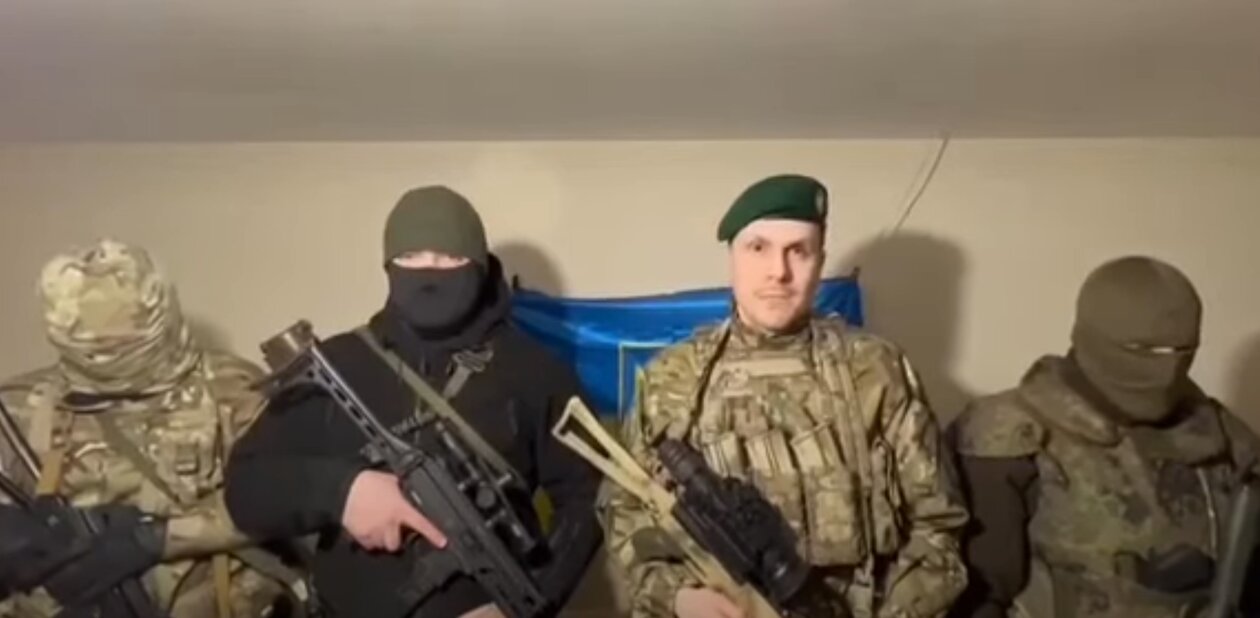This is a War of Extermination and Genocide
At the European Resilience Initiative Center, we firmly believe that the ongoing Russo-Ukrainian war is an act of colonial imperialism initiated by Russia to maintain and strengthen its imperial influence. We recognize that true and lasting peace in the region can only be achieved if Russia-populating ethnic minorities achieve independence from a colonialist Russia. To support a free, peaceful, and prosperous development of these nations, we are offering a platform to the DefundRussia initiative. Its article This is a War of Extermination and Genocide powerfully highlights the urgent need for action to be taken against Russia's aggressive and destructive activities. Here we publish an excerpt of the DefundRussia's article. You can also learn more about the campaign at https://defundrussiaswar.org

Fighters of Chechen Dzhokhar Dudayev Bataillon pledged to fight for Ukraine against Russia. A screenshot from their video statement.
There is a growing reflection on regionalism, national politics, ethnicity, racism, and forced Russification in the Russian Federation. Many indigenous people have issued anti-war statements distancing themselves from the Russian imperial position.1 Open data shows that a disproportionate number of indigenous and non-Russian people are being sent to the front and die under the Russian rule. Mobilization has taken on the character of ethnic cleansing, which continues the tradition of a racist and cynical approach to the "human resource" of the colonized territories. The "inconsistency" of the idea of dying for the Russian world in a seemingly multi-ethnic country has become more apparent than ever. Whatever forms Russian statehood takes, one can trace the continuity of its colonial policy through silencing and erasing the memory of the occupation, enslavement, forced Christianisation, Stalinist repression, and deportations. The use of different ethnic groups as a resource in the wars of the metropolis for new lands is being protested by activists who call for not supporting this policy and appeal to historical parallels: once conquered and repressed, lands and peoples should not become accomplices to new conquests.
In 2022, Russian foreign conferences organised by the Russian opposition in exile and representatives of national movements took place in Warsaw and Prague. There the League of Free Nations (LFN) was formed to develop ideas for new cartographies of the Russian Federation based on independent regions and republics governed by direct democracy with the right of self-determination. At the last 4th NFPR Congress in Helsingborg a Terminating the Russian Federation memorandum was signed, and the Russian Federation was declared a bankrupt state. The direction of thought is certainly encouraging, but further on the congress participants decided to continue meeting online. A common criticism of these congresses is that the statements are made by people from a place of fantasy, and they have no legitimacy or support from below.
On the other hand, criticism of nationalisation and the fetishisation of borders comes from left-wing authoritarians, who condemn ideas of disintegration. We have seen that, in contrast to the ideas of lavish congresses and panic over hypothetical outbreaks of nationalism in the regions, the networks of solidarity have been deployed amid the mobilization.2 They focused their efforts on legal aid for draft evasions, border crossing, and humanitarian support. Links across national borders were updated. After the announcement of the mobilisation in the Russian Federation, protests broke out in the regions, starting first with the Republic of Sakha and in the villages of Dagestan. Under public pressure the mobilisation in Chechnya was cancelled, then resumed. Representatives from Sakha, Tyva and other ethnic groups have distributed manuscripts and appeals for sabotage in indigenous languages, with ideas to damage and block logistical infrastructures, preventing mobilization in the regions. Mongolia helped the Siberian people by sheltering potential conscripts from mobilisation, while Kazakhstan has actively supported Turkic-speaking people by housing fugitives in mosques and other public spaces. The ties that these communities have along cultural, religious, and linguistic lines are now stronger and more pronounced. We also consider important the emergence of radical-separatist regional channels that support anarchist practices and call for direct action and anti-war sabotage.3 These movements cannot be ignored and should be fully supported. But we cannot expect them to be able to stop the war.
Read more about this campaign: https://defundrussiaswar.org
Bibliography:
1. https://syg.ma/@media-resistance-group/zaiavlieniia-priedstavitiel-nits-narodov-rossiiskoi-fiedieratsii-protiv-voiny
2. https://www.instagram.com/freeburyatiafoundation/
3. https://t.me/RepublicofSiberia